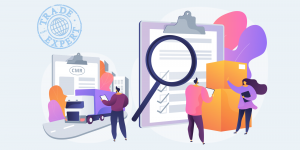
As global trade continues to grow in complexity, customs audits have become a critical component of maintaining compliance with international trade regulations. In the UK, businesses engaged in importing and exporting goods must be prepared to face a customs audit at any time. Understanding what these audits entail and how to prepare is essential for minimising risks and maintaining smooth operations.
What is a UK Customs Audit?
A customs audit is an official review conducted by HM Revenue & Customs (HMRC) to assess a business’s compliance with customs laws and regulations. The purpose is to ensure accurate reporting, correct payment of duties, and adherence to trade requirements.
Customs audits can occur as part of routine checks, in response to discrepancies in declarations, or as a result of risk profiling by HMRC.
Key Areas of Focus in a Customs Audit
During a customs audit, HMRC typically examines:
- Import and Export Declarations: Accuracy and completeness of submitted documentation.
- Tariff Classification: Correct classification of goods under the Harmonized System.
- Valuation of Goods: Compliance with customs valuation methods.
- Origin Rules: Proper application of preferential trade agreements and rules of origin.
- Duties and Taxes: Accuracy of duty and VAT payments.
- Customs Special Procedures: Use of regimes like inward processing or customs warehousing.
Consequences of Non-Compliance
Non-compliance can result in:
- Penalties and Fines: Financial repercussions for errors or omissions.
- Customs Seizures: Confiscation of goods for severe violations.
- Operational Delays: Disruptions to the supply chain while issues are resolved.
- Reputational Damage: Loss of trust with stakeholders and partners.
How to Prepare for a Customs Audit
- Maintain Accurate Records: Ensure all customs-related documentation is complete, accurate, and easily accessible.
- Conduct Regular Reviews: Periodically review your customs declarations and processes to identify potential errors.
- Stay Updated on Regulations: Monitor changes to UK customs laws and international trade agreements.
- Invest in Staff Training: Equip your team with the knowledge and skills needed to handle customs compliance.
- Engage Experts: Consider consulting with customs compliance specialists or using technology to streamline processes.
The Role of Proactive Compliance
A proactive approach to customs compliance not only reduces the risk of audit penalties but also builds credibility with customs authorities. Businesses with robust compliance frameworks are often viewed more favourably and may experience fewer disruptions during audits.
How can we help?
A UK customs audit can seem daunting, but thorough preparation and an understanding of what’s required can make the process manageable. By prioritising compliance, businesses can protect their operations, avoid penalties, and maintain efficient supply chains in today’s competitive global market.
If you’re looking for support in navigating customs audits, consider attending one of our Customs Audit Masterclasses or consulting our professional customs advisor.
Date: Thursday 13 February 9.30am to 1.30pm 
Virtual: Zoom Platform
Cost to attend: Members £250.00 + VAT and Non-Members £330.00 + VAT





